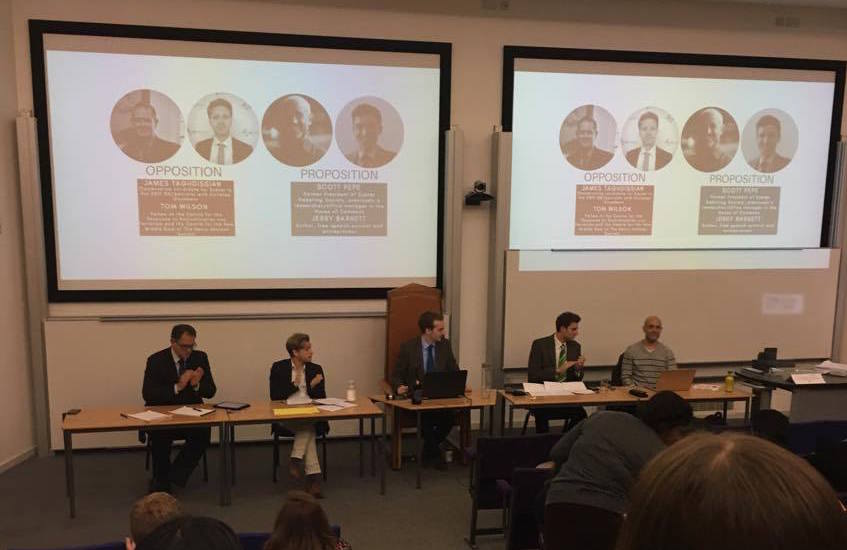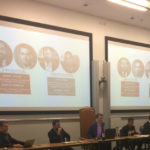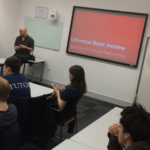
Everyone wants freedom. That’s why in last week’s show debate both sides attempted to cast themselves as its guardian. With terror dominating the headlines and our Prime Minister calling for the security services to have “the powers they need”, the issue of how to balance the maintenance of civil liberty against the need to provide safety and security remains pertinent.
Former DebSoc President Scott Pepe and free speech activist Jerry Barnett opened for the proposition arguing that introducing mass surveillance and censorship in the name of national security is an ill-justified response to the threat from terrorism. Pepe did so by attacking the utility of such measures in mitigating modern forms of terror: “When a lone wolf decides … to blow us up, shoot us or stab us simply for disagreeing with them – there’s very little the government can do”.
Barnett however emphasised the creation of “moral panics” by which the State builds climates of fear in one area “…to take away liberty in another”. Two things underpinned their proposition: a scepticism in the effectiveness of national security combined with a mistrust of the State to act with the intent it claims.
The opposition came in the form of Tom Wilson from the Henry Jackson Society, and Exeter’s Conservative candidate at June’s general election James Taghdissian. Far from infringing on our civil liberties, they pushed the idea that State provided national security is intrinsic in upholding them. Wilson encouraged us to imagine a society where we daren’t use the tube or attend concerts, concluding that it’s not “counter terror law that takes away our civil liberties, it’s the terrorists.”
“When a lone wolf decides … to blow us up, shoot us or stab us simply for disagreeing with them – there’s very little the government can do”
Taghdissian’s opening drew a similar picture, insisting that national security isn’t a “bogey man” but a necessary instrument in providing society the safety in which to exercise their civil liberties.
From the start, it was clear the debate was to centre around diverging standpoints on what it means to be free, whether the State is inherently good or bad, and the criteria against which these should be measured.
The fundamental difference stems from the foundations on which both sides built their arguments. For the proposition this was freedom. We are born free until the State erodes these liberties in the name of a security that is impossible to realise without totalitarianism. The opposition offered the reverse logic. They put it to the audience that our civil freedom derives from the State not despite it. Without government provided security, infringements on our civil liberty from for example terrorism, would go unchecked. Taghdissian surmised that “without national security measures you won’t have your civil liberties.”
The basis against which freedom is measured thrusts at the core of the debate. Whether one sees liberty as being individually free from constraints enforced from above, or rather something that results from living in a safe civil society determines the side you take.
However, it was how each side perceived the current terror threat that made the real impact. This was highlighted when The Witness asked the panel two questions. First, does terrorism pose a greater threat today than it has in the recent past? And second, has society become more or less free since?
Wilson gave a clear answer to the first question, whilst deflecting the second. He believed the terror threat to be greater now than twenty years ago. This is due to a post 2005 shift away from organised terror cells towards “inspired individuals”, and the more immediate fact that half of the Britons having travelled to Syria – are now back. On the question of freedom, he chose to move the issue away from State surveillance, stating we’ve become “no less free” in that regard. Rather he chose to criticise political correctness and soft censorship, citing that in the aftermath of Charlie Hebdo very few chose to republish the art that prompted the attack.
“without national security measures you won’t have your civil liberties”
Pepe and Barnett rubbished the idea that we live in a particularly dangerous moment. They agreed with Wilson’s proposition that there has been a move away from complex terror networks yet vehemently disagreed with its implications. Pepe claimed the present day is the “safest time to be alive in the last hundred years”. He pointed out that any threat from lone wolves is nothing compared with that posed to British society during the two world wars and the Troubles in Northern Ireland. Barnett went further calling ISIS “crap terrorists”.
On freedom, they were united in their view that society is less free because of increased state surveillance and censorship that is disproportionate to the absence of any existential threat”. “We’re safer exactly because of State power” Taghdissian retorted.
The ultimate issue of how we best prevent terror illustrates the gap between the two sides. The proposition would have one accept that terror is not a significant threat, and one that the State is ill-equipped to address. Whereas the opposition in this case believe the State has been key in the reduction of the terror threat extolled by the proposition, and needs all the power it legally requires in maintaining our security – and therefore our freedom.
The panel successfully exposed that how you understand your freedom determines how you understand this debate.
The proposition won the debate upholding the statement: “This House Would Prioritise Civil Liberties over National Security”.


Average Rating